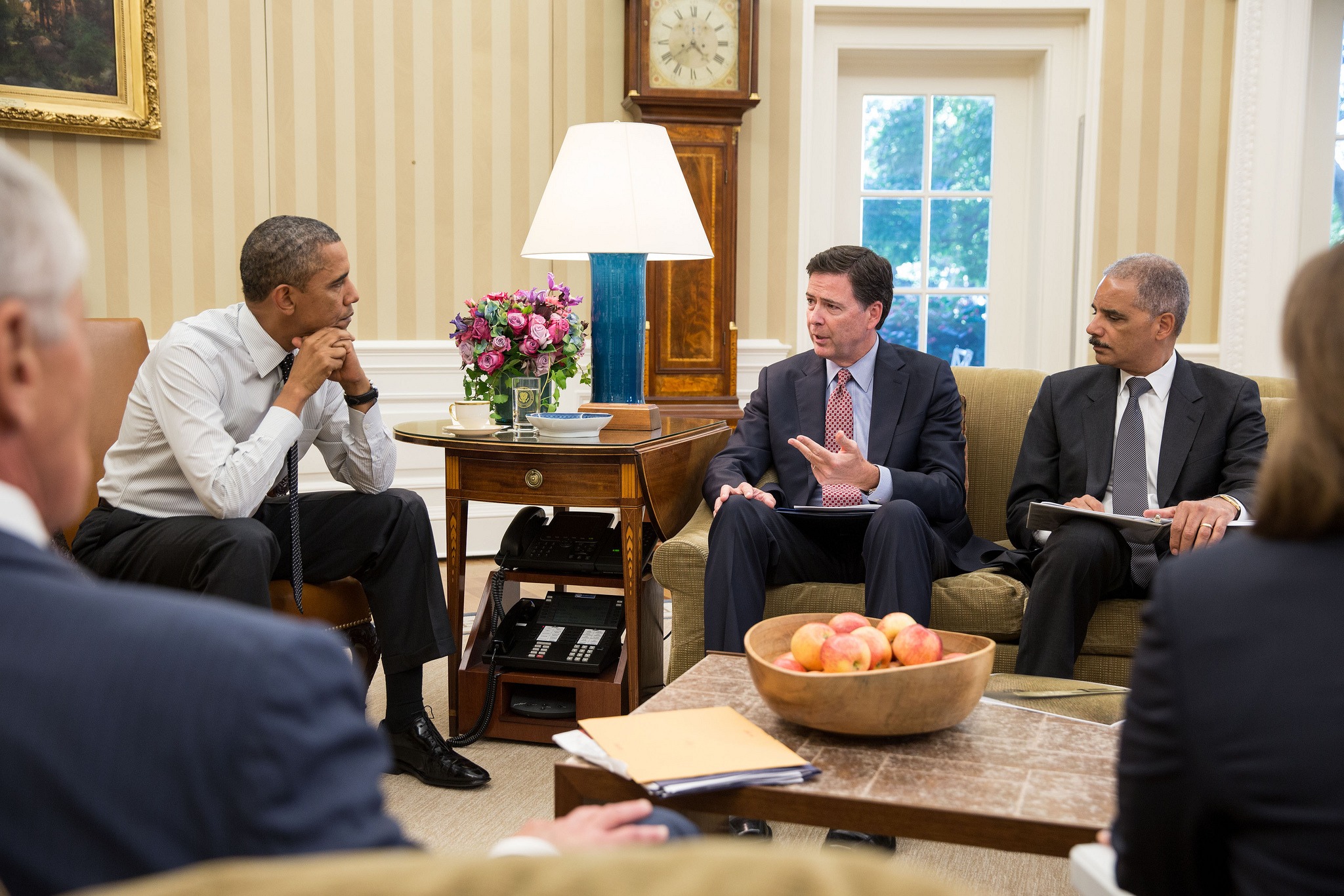FBI Director James Comey frequently describes how his Irish-American heritage formed him. Here, for example, is Comey at Georgetown University in February 2015.
I am descended from Irish immigrants. A century ago, the Irish knew well how American society—and law enforcement—viewed them: as drunks, ruffians, and criminals. Law enforcement’s biased view of the Irish lives on in the nickname we still use for the vehicle that transports groups of prisoners; it is, after all, the “Paddy Wagon.”
The Irish had tough times, but little compares to the experience on our soil of black Americans. That experience should be part of every American’s consciousness, and law enforcement’s role in that experience—including in recent times—must be remembered. It is our cultural inheritance.
There is a reason I require all new agents and analysts to study the FBI’s interaction with Dr. Martin Luther King Jr., and to visit his memorial in Washington as part of their training. And there is a reason I keep on my desk a copy of Attorney General Robert Kennedy’s approval of J. Edgar Hoover’s request to wiretap Dr. King. It is a single page.
Go find a liberal, or even a conservative defender of the constitutional restraints on police authority, who isn’t inspired by what Comey says in that one paragraph about J. Edgar Hoover’s disregard for the law.
So how does Comey get from his aversion to J. Edgar Hoover’s contempt for the law in February 2015, to October 28, when he inserted himself into the presidential election then retreated into the bowels of the FBI headquarters?
There is a lot to criticize in Comey’s report to Congress last week, referring to the emails found on Anthony Weiner’s laptop. And there are a lot of critics.
Almost 100 former Justice Department officials, in fact, Democrat and Republican, signed an open letter stating they cannot recall “a prior instance where a senior Justice Department official—Republican or Democrat—has, on the eve of a major election, issued a public statement where the mere disclosure of information may impact the election’s outcome, yet the official acknowledges the information to be examined may not be significant or new.” (Former Attorney General Eric Holder signed the letter, George Terwilliger, an acting AG in the George W. Bush administration, makes the same argument but didn’t sign.) Even Bush’s second (and disgraced) Attorney General Alberto Gonzales weighed in, arguing that Comey erred in making a politically charged announcement so close to election day.
While it’s hard to find defenders, the argument that Comey has become a political hack doesn’t wash.
What is more likely is what Jack Goldsmith and Benjamin Wittes describe in their Lawfare blog, that Comey created the circumstances that led him to put the most important presidential election of our lifetime at risk. The lawyer/scholars raise two points. Comey should never have appeared before a House committee to explain that there was nothing in Hillary Clinton’s emails that justified criminal prosecution. Nor should he have publicly discussed her mishandling of the emails after he found no reason to indict.
There is something horrible about watching a senior government official, who has used the coercive investigative capacities of the federal government, make public judgments about a subject’s conduct which the Justice Department is not prepared to indict. There is something even more horrible about a hearing in which individual members of Congress feel entitled to pick over the details of that conduct, asking about whether specific questions were asked by the FBI of specific witnesses and subjects and asking whether specific lines of inquiry were followed.
This point is rooted in important civil liberties concerns. We don’t give the FBI the power to investigate people so that it can report on their characters or behavior . . . We give the FBI these powers so that it can investigate crimes. And if the Justice Department is not going to prosecute someone, it generally has no business talking about the conduct of that person’s affairs.
Once Comey started down that road, there was no turning back.
Go find a liberal, or even a conservative defender of constitutional restraints on police authority, who isn’t inspired by what Comey says in that one paragraph about J. Edgar Hoover’s disregard for the law.
Donald Trump, predictably, doesn’t buy this line of thinking. According to Trump, Comey saved his reputation by announcing the FBI was revisiting the email investigation.
Yet until recently, Comey had a reputation, and it wasn’t in need of saving.
Consider what history, until last week, would have considered the most important moment in James Comey’s career.
In 2004, President Bush, his White House legal counsel Alberto Gonzales, and his Chief of Staff Andrew Card were pressuring the Justice Department to sign off on the administration’s (illegal and unconstitutional) warrantless wiretapping program.
Comey was deputy attorney general and after evaluating the surveillance program he convinced Attorney General John Ashcroft that there were legal and constitutional problems with the program and the DOJ had to deny certification, a decision that would have blocked warrantless wiretaps.
On the day Comey and Ashcroft arrived at that conclusion, the attorney general became acutely ill and was taken to George Washington Hospital in Georgetown for emergency surgery. Comey was designated acting AG, until Ashcroft was released from the hospital.
A week later, with the surveillance program about to expire, Comey was being driven home by his security detail when he got an 8 p.m. call from Ashcroft’s chief of staff, who had been informed by Mrs. Ashcroft that Card and Gonzales were en route to the hospital, although she had banned all visitors because of her husband’s grave condition.
Comey understood what was unfolding. He ordered his driver to “turn on the emergency equipment” and get him to the hospital. En route, he called FBI Director Robert Mueller.
In riveting testimony before the Judiciary Committee, Comey described what happened after he raced up the stairs to beat Card and Gonzales to the attorney general’s bedside.
Two DOJ officials had arrived to support him.
[I] entered, and Mrs. Ashcroft was standing by the hospital bed. Mr. Ashcroft was lying down in the bed. The room was darkened. And I immediately began speaking to him, trying to orient him as to time and place, and try to see if he could focus on what was happening. And it wasn’t clear to me that he could.
He seemed pretty bad off, and –
While Comey waited for Card and Gonzalez, Mueller had called the FBI security detail at the hospital and instructed them that under no circumstances was Comey to be “removed from the room.”
I sat down in a(n) armchair by the head of the attorney general’s bed. The two other Justice Department people stood behind me. Mrs. Ashcroft stood by the bed holding her husband’s arm, and we waited. And it was only a matter of minutes that the door opened and in walked Mr. Gonzales carrying an envelope, and Mr. Card. They came over and stood by the bed, greeted the attorney general very briefly. And then Mr. Gonzales began to discuss why they were there, to seek his approval for a matter, and explained what the matter was, which I will not do.
And Attorney General Ashcroft then stunned me. He lifted his head off the pillow and in very strong terms expressed his view of the matter, rich in both substance and fact . . . and then laid his head back down on the pillow and said to them,“But that doesn’t matter, because I’m not the attorney general. . . .There is the attorney general,” and he pointed to me—I was just to his left. The two men did not acknowledge me; they turned and walked from the room.
When Senator Chuck Schumer asked Comey who had phoned Mrs. Aschroft, he responded.
“I have some recollection that the call was from the president himself, but I don’t know that for sure. It came from the White House. And it came through, and the call was taken in the hospital.”
I followed this story as it happened and wrote about in a book I co-authored with Molly Ivins (Bill of Wrong). In this business for more than 30 years, I have never described another act of such principle and conviction.
Consider. An executive branch appointee serving at the pleasure of the president, armed with the law and our Constitution and protected by three FBI agents, standing down the president and his operatives.
On the following day, Comey was summoned to the White House, but refused to go unless accompanied by legal counsel who could sit in as a witness to any meeting with administration officials. At the White House meeting, Andrew Card insisted that he and Gonzales had visited Ashcroft “only to wish him well.”
The administration immediately approved the executive order on surveillance without the consent of the Justice Department. And Comey drafted a letter of resignation. “I couldn’t stay if the administration was going to engage in conduct that the Department of Justice had said had no legal basis,” he said at the time, warning that some of the nation’s chief law enforcement officials, including the attorney general, would be resigning with him.
President Bush and Vice President Cheney backed down.
As a member of an administration distinguished for its contempt for the Constitution, James Comey stood down the hacks and bullies doing the bidding of George Bush and Dick Cheney.
Professional and political failure in his announcement last week, yes. Along with an egregious violation of DOJ policy.
Malfeasance, for political motives, not a chance. If there is anything James Comey is not, it is a political hack.
Yet from October 28 going forward, one question will be asked by those who know the director of the FBI.
How could somebody who was once so right now be so wrong?






